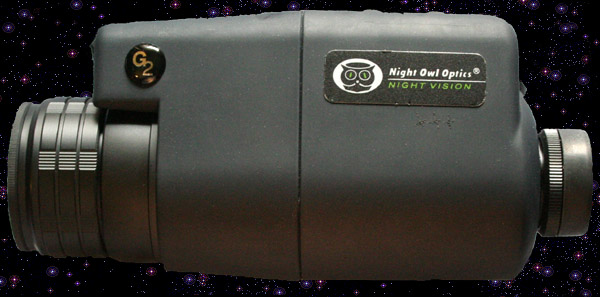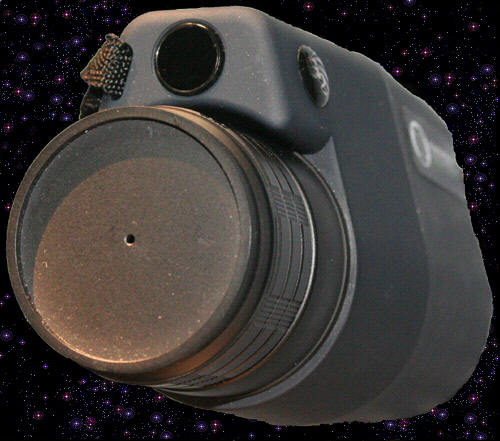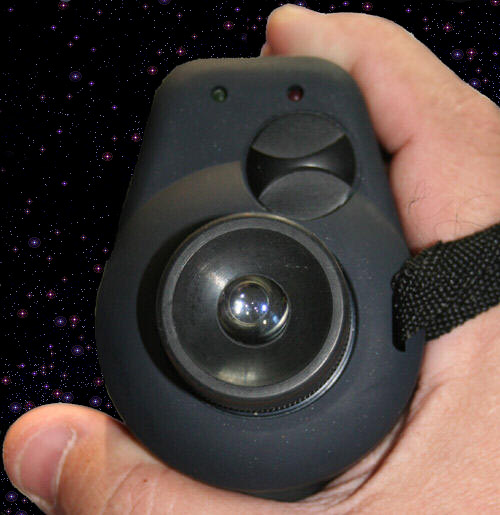The NOXG2

| Tube |
Lens |
Power |
Dimensions/weight |
Construction |
Type |
| Gen. II (15mm) |
40mm F 1.5 (3X) |
3v lithium |
6.8x2.3x3.3/ 22 oz |
Plastic. |
Night viewer |
 The NOXG2
is a compact second generation unit, which is actually priced within my
means. The unit itself is similar in size, weight and function to my Safari
Gen I scope, but a look through the eyepiece leaves little doubt as
to the differences. These second generation units use microchannel plates,
rather than the cascaded image tubes of the first generation units, and
give a much clearer, less distorted view. The second generation units
are also much more sensitive, with imager thresholds being from one
tenth to one hundredth that of the first generation units. These units
are the equal of the Gen III units except for imager life. The NOXG2
is a compact second generation unit, which is actually priced within my
means. The unit itself is similar in size, weight and function to my Safari
Gen I scope, but a look through the eyepiece leaves little doubt as
to the differences. These second generation units use microchannel plates,
rather than the cascaded image tubes of the first generation units, and
give a much clearer, less distorted view. The second generation units
are also much more sensitive, with imager thresholds being from one
tenth to one hundredth that of the first generation units. These units
are the equal of the Gen III units except for imager life.
System sensitivity depends
upon more than just the threshold of the imager. In the case of the NOXG2,
it is actually very good, because of the relative efficiency of the design.
The specially coated objective has an aperture of 1.5, which, though not outstanding,
is pretty good. The quality of the optics are good,, and the unit is well
constructed. System gain is over 5,000. Unlike first generation units,
the green glow of the viewer disappears as soon as power is turned off.
The unit is rubberized,
water resistant, and will float, though full emersion is not recommended.
The unit includes a rather powerful I.R. illuminator built right into the
body of the viewer. It is handy to carry, and is quite sturdy due to metal
stringers set within the plastic body. Power for both the imager, and the
I.R. illuminator is supplied by a 3 volt lithium type 123 battery (also
known as a CR 123A, EL 123AP, or DL 123A).
There are two membrane
switches on top of the viewer. One turns the unit on or off, the other
activates the I.R. illuminator. These buttons are the only controls on
the unit. There is a green L.E.D, to indicate power, and a yellow one to
indicate that the I.R. illuminator is active. I could do without the L.E.D.s,
as they seem to preclude any kind of stealth function for the unit.
A piece of duct tape over the L.E.D.s will probably take care of this complaint.
In contrast to this, the I.R. source is very clean, and I noticed no visible
light, and no telltale ruby glow.
Both objective and ocular
lenses have adjustable focus, The objective lens is threaded for standard
camera filters. An optional 2x converter is available for turning this
from a three power scope, into a six power scope. Also available is a camera
adapter. In addition to the second generation advantage in sensitivity,
there is also a slight extended spectral range of 350-950nm (as compared
to 400-900nm for a first generation unit). available for turning this
from a three power scope, into a six power scope. Also available is a camera
adapter. In addition to the second generation advantage in sensitivity,
there is also a slight extended spectral range of 350-950nm (as compared
to 400-900nm for a first generation unit).
The unit is small, light, quite handy, and
easy to use. It is my favorite, of all of the night vision scopes that I
own. and is the most likely to be brought along on outdoor excursions at
night. Included with the unit are a pinhole day filter, and a nylon
case. This device is claimed to be a gen 2+ device, with increased tube
life. This scope can be found selling for $1000 - $1200, and does not
appear to be of Russian manufacture.
For those of us used to the image quality of the first
generation units, the first view through a second generation device is
startling. Great resolution, and good contrast replace the comparatively
muddy and distorted view seen through the average first generation
unit. |